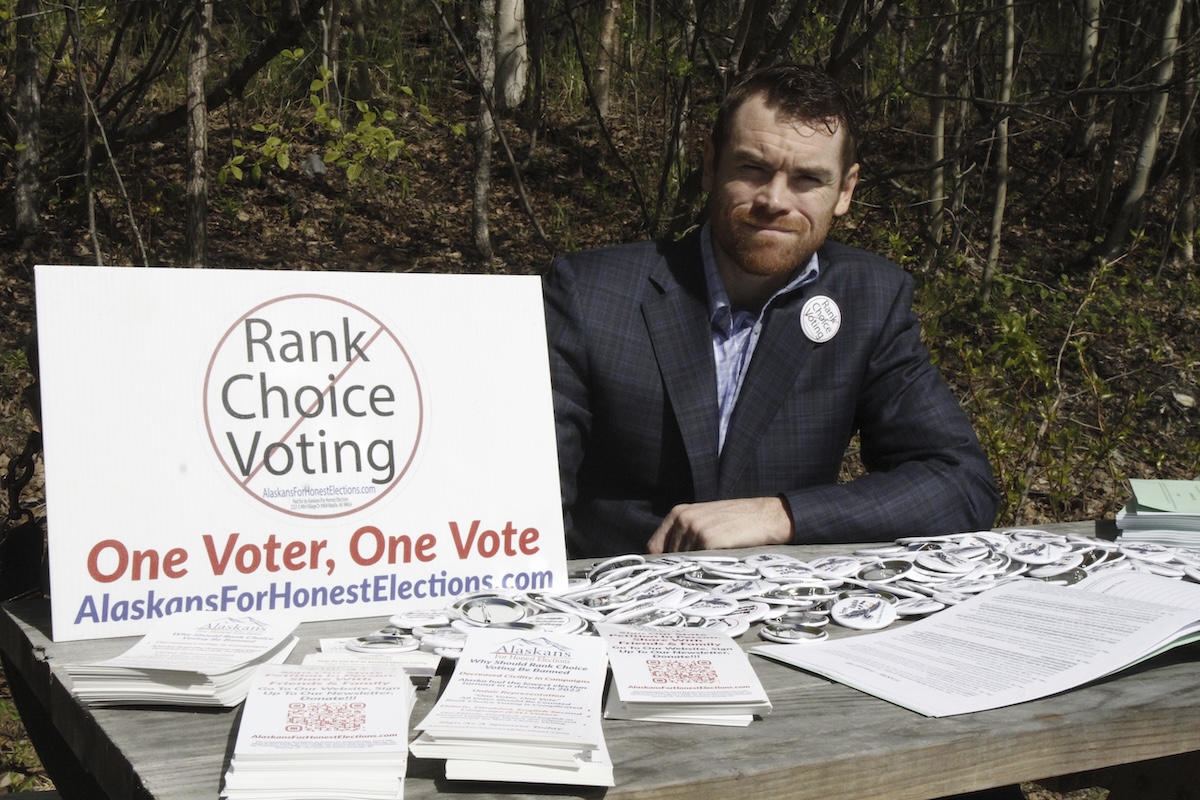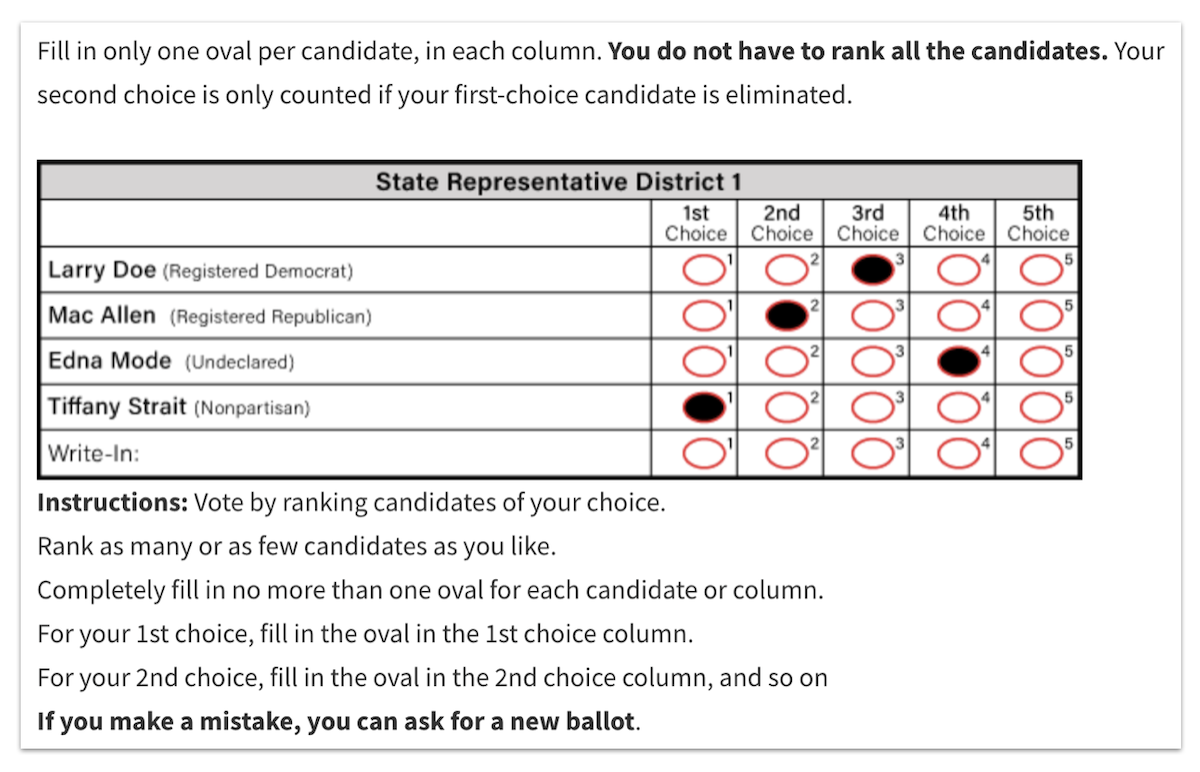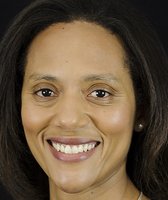Stand up for the facts!
Our only agenda is to publish the truth so you can be an informed participant in democracy.
We need your help.
I would like to contribute

Campaign buttons urging Alaskans to repeal ranked-choice voting in Alaska sit on a picnic table at the home of Phil Izon, a backer of the initiative, in Wasilla, Alaska, on May 14, 2014. (AP)
If Your Time is short
-
Alaskans voted in 2020 to change the state’s election system. Now, local political group Alaskans for Honest Elections is leading efforts to repeal the new system and revert to the old one.
-
A measure to repeal the new system could appear on the November ballot. A lawsuit seeking to disqualify the measure will be decided this summer.
-
Proponents of Alaska’s new system say it gives voters more choices at the ballot box and bolsters competition in elections. Critics say the system is confusing and disenfranchises voters.
Four years after about 51% of Alaskans voted to adopt a new election system and two years after the new system debuted, some people in the state want to hit the undo button.
A measure that aims to repeal Alaska’s system, which was first used in 2022 and includes open primaries and ranked-choice voting, will appear on the November ballot if it survives a legal challenge.
If a majority of voters approves the ballot measure, Alaska will revert to primaries controlled by the Republican and Democratic parties — where the parties can choose whether to allow ballot access to independent voters who are unaffiliated with either party — and general elections where voters cast ballots for a single candidate.
Proponents of Alaska’s open primary and ranked-choice voting system said it makes elections more competitive and improved representation because candidates across the political spectrum have been elected. Critics said the new system lacks transparency and confuses voters.
The repeal measure received enough signatures to qualify for inclusion on the November ballot. But three voters sued seeking to disqualify it, citing errors in the signature gathering and approval process. A state court will decide by mid-July whether the repeal measure can proceed.
Sign up for PolitiFact texts
Whatever the ballot measure’s fate, Alaskans will use this system for the 2024 election to decide the state’s sole U.S. House seat and dozens of state legislative races. Meanwhile, voters in two more states will consider ballot measures to adopt ranked-choice voting systems.
Here’s what to know about how Alaska’s open primary and ranked-choice voting system has worked so far, who’s behind the repeal efforts and why part of the argument against the new system doesn’t add up.
Alaska adopted an open top-four primary system. That means two things for primary elections:
-
All candidates, regardless of political party, appear on one ballot.
-
The four candidates in each race with the most votes advance to the general election.
Voters can choose one candidate per race. When there are fewer than four candidates in a race, all of them move on to the general election, regardless of the votes cast.
Then, in general elections, voters have ranked-choice voting, ranking candidates in order of preference rather than choosing a single candidate. They do this by filling in ovals on the ballot for their first-, second-, third- and fourth-choice candidates, from any political party.
If one candidate receives more than 50% of first-choice votes in the initial count, that candidate wins.
If no candidate meets that threshold, the counting extends to additional rounds. The candidate with the fewest first-choice votes in round one is eliminated. Voters who ranked the now-eliminated candidate first will have their votes reallocated to their second-choice candidate. This vote redistribution process continues until one candidate exceeds 50% of the vote.
Unlike most states, a majority of Alaska voters are not affiliated with the two major political parties. As of April 2022, state voter registration data showed about 62% of voters were registered as "nonpartisan," "undeclared" or with a minor political party. About 24% of Alaskan voters were registered Republicans and 13% were registered Democrats.
Alaska was the second state after Maine to adopt ranked-choice voting in federal and statewide elections. Dozens of U.S. cities, including New York City, also use ranked-choice voting in municipal elections, according to FairVote, a nonpartisan national group supporting ranked-choice voting.
Alaska and four other states — California, Louisiana, Nebraska and Washington — hold what the National Conference of State Legislature calls "multi-party primaries" in which all candidates, regardless of party affiliation, are listed on the same ballot. Alaska’s system is more commonly referred to as an "open top-four primary."
This fall, voters in Nevada and Oregon will vote on ballot measures to adopt election systems with ranked-choice voting for federal and some statewide races.
Carol Beecher, director of Alaska’s Division of Elections, said the state has spent $3.5 million since 2021 on the ranked-choice voting system, including education outreach and election equipment upgrades.
Switching voting systems will be expensive. If the state reverts to a party primary system and single-candidate voting, the Alaska Division of Elections estimated it would cost $2.5 million to conduct a public education campaign about the changes.
Alaskans for Honest Elections is the political group leading the effort to repeal the state’s open primary and ranked-choice voting system. Phil Izon, a Wasilla, Alaska, resident who works for an artificial intelligence technology company, said he started the repeal effort in August 2022 after his grandfather struggled with his ranked-choice voting ballot.
Phil Izon, one of the backers of a ballot initiative that would repeal ranked-choice voting in Alaska, poses for a photo May 14, 2024, outside his home in Wasilla, Alaska. (AP)
Izon, who runs the political group with his wife, Diamond Metzner, and Anchorage resident and minister Art Mathias, described it as a "grassroots" group that isn’t connected to political parties or out-of-state nonprofit groups.
Campaign disclosure reports from 2023 and 2024’s first quarter show most of Alaskans for Honest Elections’ funds have come from Izon and Mathias, and another group they created called the Ranked Choice Education Association.
The Alaska Division of Elections determined in late February that Alaskans for Honest Elections’ repeal measure had gathered 37,042 valid signatures, which exceeds the 26,705-signature threshold needed for approval. Former Alaska Gov. Sarah Palin, who was also the 2008 Republican nominee for vice president, was the first to sign.
After an August 2022 special general election for Alaska’s U.S. House seat, Izon, who is a registered nonpartisan, said Republicans in the state felt "disenfranchised" because of ranked-choice voting.
"In that race, you had like, 112,000 people vote for a Republican, and you only had 75,000 people vote for a Democrat, and yet the Democrat won the election," Izon said.
That statement is misleading. The figures Izon cites are from only the first round of vote tabulation for that race, in which about 112,000 votes were collectively cast for two Republican candidates, neither of whom received more than 50% of the vote. In the second round, the Democratic candidate received more than 50% of the vote and was declared the winner.
PolitiFact fact-checked a claim similar to Izon’s from Sen. Tom Cotton, R-Ark., in September 2022 and rated it Mostly False.
The 2022 special general election, in which voters ranked candidates, was held on the same day as Alaska’s 2022 primary elections, in which voters chose a single candidate for each race.
Izon speculated the concurrent elections likely led to "significant confusion" and "a significant portion of voters" might have opted to choose only one candidate in the special general election, rather than rank the candidates. He provided no data to support that claim.
After the 2022 special general election’s first round of voting, Republican Nick Begich received the fewest first-choice votes and was eliminated. Of the 53,810 voters who ranked Begich first, 27,053 of them ranked Republican Palin second and 15,467 more ranked Democrat Mary Peltola second. The Palin and Peltola votes were reallocated after Begich was eliminated, and Peltola was declared the winner with 51.48% of the vote.
About 11,200 votes were "exhausted" after the first round, meaning those voters selected Begich as their first choice, but ranked none of the other candidates. Izon said voter confusion during the August 2022 elections and low voter turnout during the November 2022 general election underscored the need for better education about ranked-choice voting.
Nearly 37% of the voting-eligible population participated in the August 2022 special general and primary elections — the state’s highest primary turnout since 2014. The November 2022 general election had an almost 51% voting-eligible-population turnout, which was the state’s lowest since 1976, the earliest year with available data. (The voting-eligible population includes Alaskans who are 18 and older and excludes noncitizens and felons.)
"I’m not against reform, but I am against force-feeding people something that they may not understand or are ultimately going to make mistakes and then not show up to vote anymore because they don't get it," Izon said.
Alaska Senate Majority Leader Cathy Giessel, a Republican, told PolitiFact that the state’s GOP is "vehemently opposed" to ranked-choice voting. But Republican efforts to repeal Alaska’s new election system through legislation have so far failed.
A lawsuit seeks to disqualify the repeal measure, saying its sponsors "intentionally conducted their signature petition drive illegally, thereby disqualifying thousands of signatures." The voters who filed the April lawsuit are represented by attorney Scott Kendall, who authored the 2020 ballot measure that established the open primary and ranked-choice voting system.
A decision from the Anchorage Superior Court is expected this summer, court documents show. If a state judge rules in favor of the repeal measure, it will appear on the November ballot.
Proponents of Alaska’s new election system have also filed several complaints against Alaskans for Honest Elections, accusing its leaders of violating the state’s campaign finance rules. In January, Alaska’s campaign ethics commission fined Mathias and Izon more than $94,000 after it found their groups violated state law by funneling their funding through a tax-exempt church and inaccurately reporting funds.
Advocates for keeping Alaska’s open primaries and ranked-choice voting say the system gives Alaskans more choices at the ballot box, encourages competition in elections and leads to candidates with broad appeal among voters.
(Screengrab from the Alaska Division of Elections’ website)
Juli Lucky, director of Alaskans for Better Elections, which supports keeping the new system, said she believes it doesn’t favor one political party over another. Lucky pointed to Alaskans in 2022 electing conservative Republican Mike Dunleavy as governor, moderate Republican Lisa Murkowski as U.S. senator and Democrat Peltola as the state’s U.S. House member. (Peltola was also the first Alaska Native elected to Congress.)
Giessel, the state Senate majority leader, said she changed her campaign strategy in 2022 to win back the seat she lost in 2020. With Alaska’s new election system, Giessel said she chose to appeal to all voters, rather than just Republicans as she had in the past. (Giessel now serves as a board member of Alaskans for Better Elections’ Foundation, the group’s nonprofit affiliate.)
"This was an open primary. I needed everyone's vote. And so, I simply started walking door to door, going to every single door," Giessel said. "I knocked on doors that I would have walked past in previous years."
During her door-knocking, Giessel said she met Democrats who said they had never voted for a Republican before. Giessel asked these voters to rank her as their second-choice candidate. Giessel received 36% of the vote in the primary, the most among the three candidates, then won the race after two rounds of ranked-choice voting tabulation in the general election, with about 57% of the vote. She now serves as state Senate majority leader.
FairVote and Unite America, a nonpartisan election reform group, analyzed Alaska’s 2022 election results and found that more than 99% of ballots were correctly cast in the ranked-choice voting elections.
In an August 2022 exit poll commissioned by Alaskans for Better Elections, 62% of the 1,200 voters surveyed said they favored open top-four primaries. Survey results shared by the group did not say how voters responded when asked about ranked-choice voting.
After the November 2022 election, Alaskans for Better Elections commissioned another poll, in which 79% of the 800 Alaska voters surveyed said using a ranked-choice voting ballot was "simple." The poll also found 58% of poll respondents said Alaska’s elections were more competitive under the new system.
Lucky said she encourages people who are unsure about Alaska’s new system to ask themselves, "What are the real reasons I don’t like the system?"
"Are those parts of the system … that I dislike?" Lucky said. "Or is it the outcome of the one election we’ve had under the system that I don’t like?"
Our Sources
Phone interview with Deb Otis, research and policy director at FairVote, April 29, 2024
Phone interview with Alaska state Sen. Cathy Giessel, April 30, 2024
Phone interview with Phil Izon, director of Alaskans for Honest Elections, April 30, 2024
Phone interview with Nick Troiano, executive director of Unite America, May 1, 2024
Phone interview with Gerald McBeath, emeritus professor of political science at the University of Alaska, May 1, 2024
Phone interview with Juli Lucky, executive director of Alaskans for Better Elections, May 1, 2024
Phone interview with Jeannette Lee, Alaska research director at Sightline Institute, May 1, 2024
Email exchange with Patty Sullivan, spokesperson for Alaska Department of Law, April 30, 2024
Email exchange with Carol Beecher, director of Alaska’s Division of Elections, May 21, 2024
Alaska Division of Elections, Election Information," accessed May 2, 2024
Alaska Division of Elections, "Number of registered voters by party," April 3, 2022
Alaska Division of Elections, "2022 Special General Election RCV Tabulation August 16, 2022 Official Results," Sept. 2, 2022
Alaska Division of Elections, "Petition Status," accessed May 2, 2024
Alaska Division of Elections, "Alaska’s Primary Election History," accessed May 2, 2024
Alaska Public Offices Commission, Campaign disclosure form for Alaskans for Honest Elections, first quarter of 2023, accessed May 24, 2024
Alaska Public Offices Commission, Campaign disclosure form for Alaskans for Honest Elections, second quarter of 2023, accessed May 24, 2024
Alaska Public Offices Commission, Campaign disclosure form for Alaskans for Honest Elections, third quarter of 2023, accessed May 24, 2024
Alaska Public Offices Commission, Campaign disclosure form for Alaskans for Honest Elections, fourth quarter of 2023, accessed May 24, 2024
Alaska Public Offices Commission, Campaign disclosure form for Alaskans for Honest Elections, first quarter of 2024, accessed May 24, 2024
FairVote, "Ranked Choice Voting Information," accessed May 2, 2024
FairVote, "Analysis from Alaska’s RCV elections in November 2022," Dec. 23, 2022
Unite America, "Alaska's Election Model: How the top-four nonpartisan primary system improves participation, competition, and representation," October 2023
Unite America, "Setting the record straight on voter turnout in Alaska," April 24, 2023
Unite America, "Alaska Candidates & Turnout Data" spreadsheet, accessed May 24, 2024
University of Florida Election Lab, 2022 General Election Turnout, Dec. 27, 2023
National Conference of State Legislatures, "Brief State Primary Election Types," Feb. 6, 2024
Sightline Institute, "Nonpartisan Open Primaries Let Alaskans Choose Values Over Party," April 3, 2024
Alaska Legislature, "HB 4," accessed May 2, 2024
Alaska Legislature, "HB 4 fiscal note," May 10, 2023
Alaskans for Honest Elections website, accessed May 2, 2024
Alaskans for Better Elections website, accessed May 2, 2024
Alaskans for Better Elections, "MEMO: Alaska Exit Poll Results - New Election System," Aug. 30, 2022
Alaskans for Better Elections, "Polling Shows Alaskan Voters Received Clear Instructions on the System, Found Ranking to be "Simple," and saw more Competitive Races," Nov. 15, 2022
Anchorage Superior Court, Lawsuit filed against repeal ballot measure, April 2, 2024
PolitiFact, "How Tom Cotton misleads about ranked choice voting in Alaska," Sept. 2, 2022
PolitiFact, "Why Trump is wrong to call Alaska’s ranked choice voting 'rigged'," July 22, 2022
PolitiFact, "Democracy experts support Alaska’s move to ranked choice voting. Here’s why," April 26, 2022
Ballotpedia, "Alaska Repeal Top-Four Ranked-Choice Voting Initiative (2024)," accessed May 2, 2024
Anchorage Daily News, "Ballot measures on ranked choice repeal, minimum wage increase likely to go before Alaska voters," Feb. 27, 2024
Anchorage Daily News, "Lawsuit asserts Alaska elections officials illegally certified ballot question on ranked choice voting," April 3, 2024
Alaska Public Media, "Complaint alleges foes of Alaska’s ranked choice voting formed a church to funnel political donations," July 6, 2023
Anchorage Daily News, "Alaska ranked choice voting opponents fined over $94K for campaign ethics violations," Jan. 4, 2024
Alaska Public Media, "Alaska House committee advances legislation to repeal ranked choice voting," Jan. 18, 2024
Alaska Public Media, "Alaska Senate president Cathy Giessel loses primary," Aug. 19, 2020
Alaska Public Media, "Recount in Alaska Senate race reaffirms Giessel as winner," Dec. 8, 2022
NPR, "Mary Peltola, the first Alaska Native heading to Congress, journeys home to the river," Sept. 5, 2022
The Associated Press, "Lawsuit asks judge to disqualify ballot measure that seeks to repeal Alaska's ranked voting system," April 3, 2024
Alaska Beacon, "Alaska ranked choice repeal measure wins first round of legal challenge, but trial awaits," June 11, 2024


































